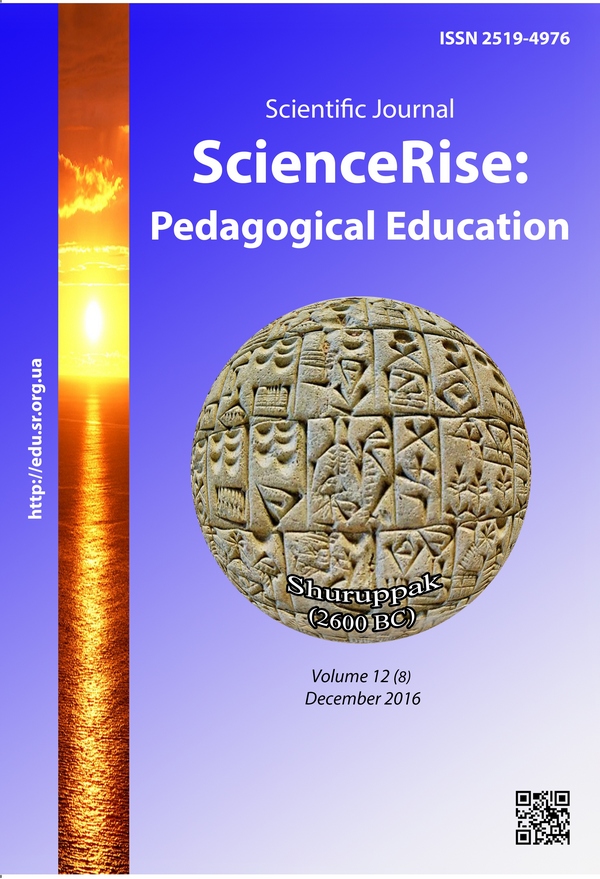Analysis of pedagogical approach features in physical education of pre-school aged children
DOI:
https://doi.org/10.15587/2519-4984.2016.86136Keywords:
training, pedagogical approach, physical education, children, preschool age, physical healthAbstract
We know that pre-school is one of the most critical periods of human life in formation of physical health, providing its improvement, strengthening and preserving in future, so the problem of formation of pedagogical approach to physical education of children of pre-school age at classes is seen to be actual. It is shown that in a definite pre-school necessary conditions were implemented and classes with sport games were carried out taking into consideration children state of health and their preferences. It is proved that during the year children’s physical health indicators were significantly optimized –increased were the levels of physical development and percentage of harmoniously developed children, the number of children with stress adaptation mechanisms decreased, also levels of physical fitness increased and number of absenteeism due to illness reduced. It was established that professional training of future teachers-coaches in kindergartens should be based on the principles of the theory and methodology of physical education and sports and the initial state of health of pre-school aged children
In whole the results occured demonstrate the effectiveness of pedagogical approach to raising interest to physical activities and improving indicators of health level and can be recommended while training pre-school children.
References
- Dudina, O., Tereshchenko, A. (2014). Situational Analysis of Children’s Health. Bulletin of Social Hygiene and Public Health of Ukraine, 2 (60), 49–57.
- Kvitashvili, O. (Ed.) (2015). Annual Report on the State of Health, Sanitary and Epidemiological Situation and the Results of the Health Care System of Ukraine. Kyiv, 460.
- Vilchkovskiy, E., Kurok, A. (2008). Theory and Methods of Physical Education of Pre-school Aged Children. Sumy: VTH «University Book», 428.
- Vorontsova, I., Prokopev, N. (2014). Features of Physical Education of Pre-school Aged Children. Young scientist, 2, 305–309.
- Glazyrina, L., Ovsyankyn, V. (2005). Methods of Physical Education of Pre-school Aged Children. Moscow: VLADOS, 176.
- Komisaryk, M., Chuyko, G. (2013). Theory and Methods of Physical Education of Pre-school Aged Children. Chernivtsi: Books, 484.
- Minaev, B., Shiyan, B. (2002). Principles of Methods of Physical Education of Shoolchildren. Moscow, 455.
- Apanasenko, G. (2009). Health Protection of Healthy Persons: Formulation of Problem in Ukraine. Ukrainian Medical Journal, 4 (72), 122–124.
- Harrison, J. M., Blakemore, C. L., Buck, M. M. (2005). Instructional Strategies for Secondary School Physical Education. Ohio: McGraw-Hill Higher Education.
- Zganyayiko, G., Postovalov, V. (2012). Mobile games. Cherkasy, 105.
Downloads
Published
How to Cite
Issue
Section
License
Copyright (c) 2016 Bogdanovskiy Igor

This work is licensed under a Creative Commons Attribution 4.0 International License.
Our journal abides by the Creative Commons CC BY copyright rights and permissions for open access journals.
Authors, who are published in this journal, agree to the following conditions:
1. The authors reserve the right to authorship of the work and pass the first publication right of this work to the journal under the terms of a Creative Commons CC BY, which allows others to freely distribute the published research with the obligatory reference to the authors of the original work and the first publication of the work in this journal.
2. The authors have the right to conclude separate supplement agreements that relate to non-exclusive work distribution in the form in which it has been published by the journal (for example, to upload the work to the online storage of the journal or publish it as part of a monograph), provided that the reference to the first publication of the work in this journal is included.







